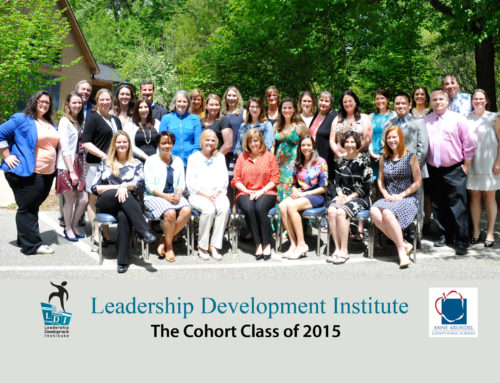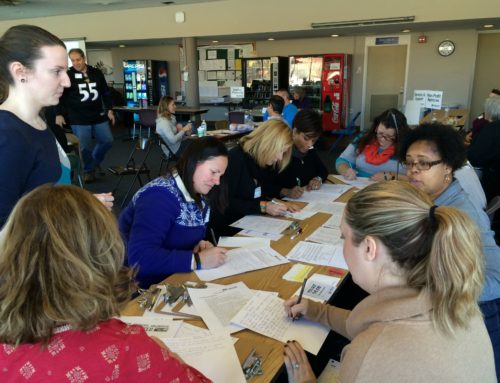Exploring Environmental Factors, AACPS Facilities, & Sustainability
April 10, 2015
A Perfect Morning to Spend Outside

This month we had the opportunity to spend the day exploring Arlington Echo. From the shoreline to the water, we walked through nature to better understand the beauty that this county has to offer and the work Arlington Echo does to help children and adults alike better understand how to preserve it.
Arlington Echo is Anne Arundel County Public School’s Outdoor Education center. With 24 acres of land and 1,750 feet of shoreline, Arlington Echo offers a space for students to learn through nature–directly engaging with the life around them to learn about their ecosystem, develop team working, and build early literacy skills. Offering day excursions, weekend retreats, and summer programs, Arlington Echo provides year-round opportunities for students in grades K-12. Arlington Echo also hosts STEM Internships, a Summer Works program, and Professional Development opportunities (for students and adults) such as the Initiative and Confidence Course.
On Saturday, we experienced some of these educational programs first hand. After a brief introduction in the dining hall, we broke into groups to explore the water, shoreline, and inland of Arlington Echo. Guided by members of the Arlington Echo team, we walked through the camp, searching for insects, identifying native and invasive species of plants, and learning about the environmental impact of pervious versus impervious surfaces. Along the way, Kathleen and I found a two-friend tree (a tree whose trunk is big enough to need two people to wrap their arms around it) and Laura planned her spring garden to incorporate native flowers and grasses.
My favorite part of the morning was seining in the Severn River. Dressed to the nines in our waders, we ventured into the river to look for crabs and fish. We had zero luck, of course, but it was exciting to be getting our hands dirty. Standing waist-deep in the river, it was easy to see why students connect so much with this place. Far from the structure of the traditional classroom, Arlington Echo offers space for kids to be kids—to run, jump, and play while being encouraged to get messy. With a trained guide just a few steps away, students of all ages can safely take risks as they explore and learn about the world around them.

Bringing the Classroom Outside
After lunch, we met with several members of the Arlington Echo team to discuss the curricular opportunities available through the effort of the Office of Environmental Literacy and Outdoor Education. In response to former Superintendent Dr. Maxwell’s decision to make environmental literacy a graduation requirement (the first school district in the nation to have such a requirement), AACPS is developing a K-12 Environmental Literacy curriculum that weaves this focus throughout the county’s standards for Mathematics, Language Arts, Science, and Social Studies.
Throughout the course of their education, students have many opportunities to engage with the environment, both in the classroom and through field experiences, and to consider the relationship between themselves and their local Chesapeake Bay. In kindergarten, every child visits Camp Woodlands to discover why “Trees are Terrific!” and then returns to plant trees at their school; in 4th grade, every student visits Arlington Echo to explore the Severn River and its watershed; and in high school, biology students measure the biodiversity at their schools for the Bioblitz program. From building monarch butterfly gardens to planting Bay grasses to protecting eels, oysters, and terrapins, over tens of thousands of students are asked to step out of the classroom and get to know the world around them.
Directly, this curriculum is designed to make a positive impact in the health and diversity of our local ecosystem. But indirectly, it gives students the chance to take risks and learn through the application of knowledge. These early literacy programs often force students to step outside of their comfort zone (sometimes literally), offering a safe space for children who may be reluctant to participate in the classroom a way to engage in other ways. Preliminary research conducted by Arlington Echo has shown that students who have engaged in their hands-on programs increase student confidence, motivation, and test scores when compared with students who have not completed these programs. And, by weaving environmental literacy throughout all subjects, this dynamic curriculum challenges students to understand the ways in which the environment impacts policy, economics, and history.
The Arlington Echo team is an incredibly dedicated and passionate group of individuals, many of whom first fell in love with Arlington Echo when they visited as elementary students in this county. Through their engaging curriculum and programs this team helps us all remember that we are lucky enough to live in this beautiful county—so we have the responsibility to keep it that way.
But Don’t Take My Word for It
The true testament to the success of these programs is in the willingness of schools to share their experience. So in closing for this month I invite you to take a look at Arlington Echo through the eyes of our students. Below are some links to just a few of the videos created by AACPS schools to document their experience with Arlington Echo:






